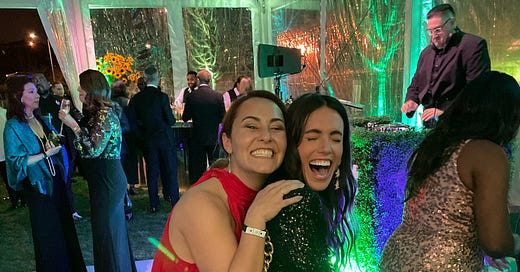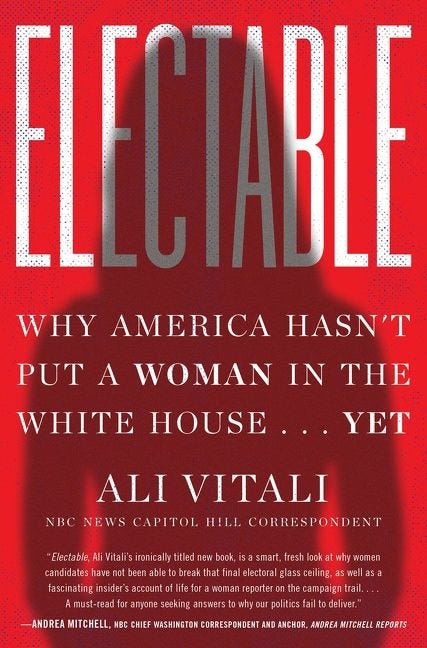As I continue to recover from having a giant needle inside my uterus puncture my vaginal wall and ovarian capsule because I got my eggs frozen this week, I want to share one of my favorite upcoming fall reads with you. It’s from my friend Ali Vitali who has been by my side since my first year of trying to make it as a journalist. I remember being semi-blacked out somewhere in the 30 Rock cafeteria when a booker had taken a chance and decided to let some french-canadian feminist go on air, and Ali came up to me with the warmest smile demanding that we become friends, and so we did. We spent the next few years spending every sunday producing a weekly women’s news show you never heard of called Krystal Clear on MSNBC’s streaming channel and sneaking hangs between live shots. Here we are at the White House Correspondent’s Dinner this year being very professional in front of all our colleagues.
As a veteran presidential campaign reporter and Capitol Hill correspondent for NBC News, Ali has seen it all, especially when it comes to the sexist treatment of female politicians. I remember having conversations with her while we both were on the campaign trial in Iowa in 2020 about how asinine it was that the most common question about the unprecedented number of overqualified women in the field that year is whether or not they were “electable.” This frustration prompted her to write a book dedicated to answering that question with another question: why don’t we ever ask that about the men? Electable: Why America Hasn't Put a Woman in the White House . . . Yet is an extraordinarily well-executed examination of the unique barriers women face in politics and what it would take for us to finally put them to bed. Ali is delighted to share a short excerpt with you about the undeniably fascinating dynamic she observed between Senator Amy Klobuchar and Pete Buttigieg when they both ran for president in 2020. I hope you enjoy it.
Sitting in a TV studio in Minneapolis in November 2019, Amy Klobuchar’s team was torn.
A few days earlier, a story in The New York Times quoted Klobuchar as saying a woman with equal or less experience than South Bend mayor Pete Buttigieg would struggle to be taken seriously as a presidential contender. “Could we be running with less experience than we had? I don’t think so,” she told the Times. “I don’t think people would take us seriously.”
Criticism aside, of course, the Klobuchar-Buttigieg rivalry was well documented, too. From very public digs across multiple debates to the more low-key, like an email from Klobuchar staff to reporters making sure we knew the “interesting bit of context” that Klobuchar’s Fox News town hall garnered 500,000 more viewers than Buttigieg’s. Not that they were counting.
The question now, as Klobuchar sat in a Minnesota greenroom readying for a Sunday show interview with CNN, was would she lean into the latest public twist in this rivalry—a potentially bumpy and heavily gendered rhetorical road—or pull a U-turn and head back for smoother pastures?
Some in Klobuchar’s orbit were reticent about engaging further, worried that by continuing to speak honestly about this gendered dynamic would sound like she was complaining about a rival’s rise rather than speaking to sexist undertones in presidential politics. Being a woman who was also in the race for president, complaining about the unfair dynamics faced by women running for president, could ring hollow or seem selfishly biased.
One longtime Klobuchar campaign aide told me they worried it wouldn’t be helpful to have the women who were experiencing sexism be the ones to call it out because the grievances were treated as “in the eye of the beholder” as opposed to an objective commentary. Never mind that this small crop of women were the exact people who could speak the most credibly regarding the sexism of the process.
Some were also concerned it would derail her campaign’s message – which was decidedly and purposefully not woman- or gender-centric— into one that was. She’d fall into the same trap other marginalized candidates talked about falling prey to: being the woman talking about women’s issues instead of the Minnesota senator talking about kitchen table issues and how she legislated around them.
But others on the campaign saw upside in her boss doubling down— not because it was the safe communications strategy (it probably wasn’t), but because it was a chance to speak to the realities of the campaign in an authentic way.
Because, really, a theoretical Mayor Paula would probably not have been allowed such a meteoric national, presidential rise as Mayor Pete. The bar was higher, the hills steeper, the pitfalls more plentiful, the shoes less comfortable for female candidates. These were just the facts. But ultimately, it was Klobuchar’s call.
You can buy Electable: Why America Hasn't Put a Woman in the White House . . . Yet at your local real-life or digital bookstore!
I can’t wait to see you next week x
Liz-








Ali is awesome! Been a fan ever since she rolled into 30Rock from NOLO... she used to do a vlog series ... and my first thought is “we will all be working for Ali one day!” So cool that you both are friends and can’t wait to dig into my copy of her book!